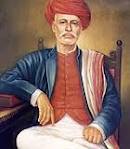 Mahatma Jotiba Govindrao Phule (1827 — 1890) was an activist and social reformer from Maharashtra. Jotiba Phule and his wife Savitribai Phule were the pioneer of women's education in India. His remarkable influence was apparent in fields like education, agriculture, caste system, women and widow upliftment and removal of untouchability. He is most known for his efforts to educate women and the lower castes as well as the masses. He, after educating his wife, opened a school for girls in India in August 1848. This was the second girls school in India.
Mahatma Jotiba Govindrao Phule (1827 — 1890) was an activist and social reformer from Maharashtra. Jotiba Phule and his wife Savitribai Phule were the pioneer of women's education in India. His remarkable influence was apparent in fields like education, agriculture, caste system, women and widow upliftment and removal of untouchability. He is most known for his efforts to educate women and the lower castes as well as the masses. He, after educating his wife, opened a school for girls in India in August 1848. This was the second girls school in India.
In September, 1873, Jotirao, along with his followers, formed the Satya Shodhak Samaj (Society of Seekers of Truth) with the main objective of the organisation as to liberate the Bahujans, Shudras and Ati-Shudras and to prevent them from exploitations and atrocities. He opposed idolatry and denounced the chaturvarnya system (the caste system). Satya Shodhak Samaj propounded the spread of rational thinking and rejected the need for a Brahman priestly class as educational and religious leaders. Despite this he remained a Hindu by religion till end and never renounced his faith. He was against those Brahmins who were using religion and blind faith of masses for their own monetary gains.
He set out to attack the Brahmans’ claim that they were superior to others, since they were Aryans. Phule argued that the Aryans were foreigners, who came from outside the subcontinent, and defeated and subjugated the true children of the country. As the Aryans established their dominance, they began looking at the defeated population as inferior, as lowcaste people. According to Phule, the “upper” castes had no right to their land and power: in reality, the land belonged to indigenous people, the so-called low castes. Phule claimed that before Aryan rule there existed a golden age when warrior-peasants tilled the land and ruled the Maratha countryside in just and fair ways.
In 1873, Phule wrote a book named Gulamgiri, meaning slavery. Some ten years before this, the American Civil War had been fought, leading to the end of slavery in America. Phule dedicated his book to all those Americans who had fought to free slaves, thus establishing a link between the conditions of the “lower” castes in India and the black slaves in America.
He set out to attack the Brahmans’ claim that they were superior to others, since they were Aryans. Phule argued that the Aryans were foreigners, who came from outside the subcontinent, and defeated and subjugated the true children of the country. As the Aryans established their dominance, they began looking at the defeated population as inferior, as lowcaste people. According to Phule, the “upper” castes had no right to their land and power: in reality, the land belonged to indigenous people, the so-called low castes. Phule claimed that before Aryan rule there existed a golden age when warrior-peasants tilled the land and ruled the Maratha countryside in just and fair ways.
In 1873, Phule wrote a book named Gulamgiri, meaning slavery. Some ten years before this, the American Civil War had been fought, leading to the end of slavery in America. Phule dedicated his book to all those Americans who had fought to free slaves, thus establishing a link between the conditions of the “lower” castes in India and the black slaves in America.
You might also interested in
2. Arya Samaj
4. Vinoba Bhave





0 comments: